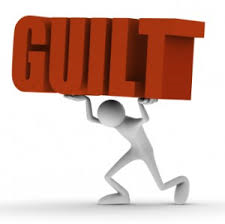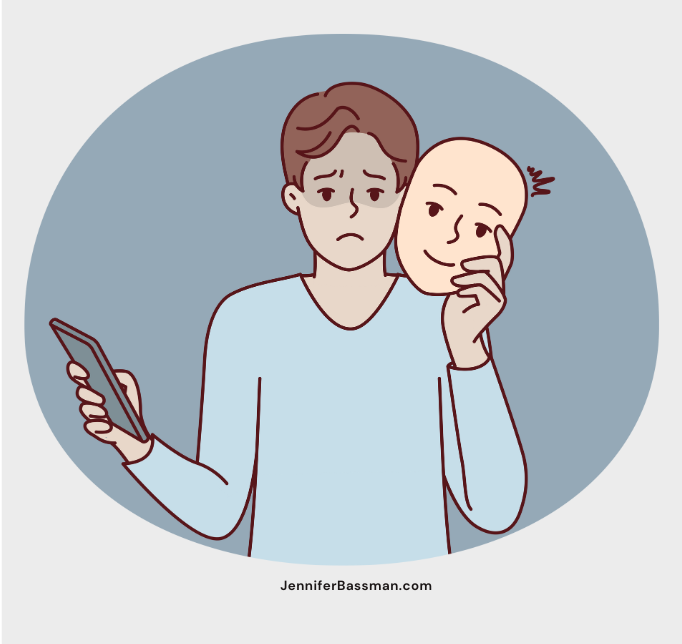Over the years, I have thought a lot about the role guilt plays while someone is burned out. (Guilt is a strong driver of burnout.)
Guilt is an emotion that can spiral out of control and “force” you to do things you don’t want to do or normally wouldn’t do.
When I was burned out, my guilt led to a lot of resentment.
Burnout & Guilt
The guilt that directs burnout is charged by decisions made by others. There is a voice in your head that keeps telling you that you need to keep going well beyond the point of finishing your work. That voice – it actually belongs to someone else.
The voice is a by-product of “shoulds” that we have internalized from bosses, parents, teachers, colleagues, and friends over the years. The “shoulds” feel obligatory.
People experiencing burnout often describe feeling a lack of control, that they aren’t making decisions for themselves. This may be partially true because you lack reliable decision-making skills. Your ability to make solid decisions is usually clouded and prohibited by your body’s natural stress response. It also feels like your body and your mind have gone rogue and decided to be unproductive on their own.
You feel guilty because you lack productivity, lack enthusiasm, and the quality of your work isn’t good. In the process, you pile on more guilt when you realize you are disappointing others with your poor performance.
The Antidote
The only way out of this cycle is to start making decisions on your own and doing what it is you actually want to do. Making this shift in thinking gives you back control over your decisions and you feel less guilty because you have emptied the fuel that can drive burnout.
Choice destroys guilt because it says “I choose” rather than “I lose” with the decisions made by others. And, more importantly, choice makes you feel empowered.
Here’s an example:
Your friend invites you to a party that she says you shouldn’t miss. You really don’t want to go – but you show up anyway. You know you will feel resentful being there because you felt forced to be there and that you “should” go.
However, if you tell yourself out loud that you are going to the party to support your friend – even though you don’t want to – you aren’t going to feel resentful because you felt empowered to make a decision based on the language you used.
If you decide to stay home – even though you feel you “should” go – you are still leaving that decision up to someone else because you are allowing them to manipulate your emotions (make you feel guilty).
But, if you stay home with the reason of “I’m exhausted” or “I went to another party of hers recently,” you won’t feel guilt because you are using the power of choice, you feel as though you are making the choice to stay home.
This is why, as a burnout recovery coach, I spend a lot of time with my clients re-learning priorities. When decisions are anchored by the things most important to you, you typically feel like you are making your own decisions based on what you want. Because your priorities are based on what you want!
Does The Guilt Ever End?
Fair question and the answer is no. Guilt is a natural emotion. How much of it you feel and how you allow it to control your emotions or behavior is up to you.
When burned out, there is a lot of guilt related to resting and doing less as you recover. You probably know, deep down inside, that this guilt is illogical. But, it takes some time to remove the “shoulds” and obligatory feelings from your internal dialogue.
Keep in mind: just because you feel guilty doesn’t mean you need to act on it.
Strategies to Reduce Your Guilt
Let’s talk strategies to reduce your guilt and/or keep you from acting on it. Here are five strategies you can try:
- Don’t “should” yourself.
Telling yourself that you “should do this” or you “should do that” is self-critical and judgmental. When you criticize and judge yourself, you shut down the opportunity for other solutions or possibilities. (An open door for guilt!) Let go of the “shoulds” by learning where those thoughts develop so you can challenge them. - Practice positive thinking.
When you are burned out, it is really easy to maintain a negative mindset and find more fuel for damaging thoughts – which can lead to guilt. Change the game by introducing small opportunities to be exposed to positive thinking. Leave yourself notes on mirrors, on your desk, in your car that offer a positive thought. Or, remind you of the good in yourself. - Try journaling.
One way to release guilt is by expressing your feelings in a journal. Sometimes it helps to see your thoughts on paper because reading it back can signal to your brain that these ideas don’t make sense. - Focus on quality, not quantity.
Instead of feeling bad about not doing more things or being as productive as you’d like, learn to appreciate what you can do. This initiates the practice of mindfulness and gratitude – which are also guilt destroyers. When I remind myself that I am lucky to be able to do something or that I have a talent that not many other people possess, I feel less guilty about productivity and want to focus on the quality of work or time I spend with someone. - Forgive yourself.
Forgiving yourself is essential to releasing your guilt. You didn’t become burned out on purpose. And, your inability to be yourself temporarily is part of the process of change. While you are burned out, you may make mistakes – but everyone makes mistakes whether they are burned out or not.
BOUNDARY SCRIPTS
When you are challenged by family, friends and coworkers with awkward questions or statements, it’s tough to know what to say to communicate your boundaries. My quick reference guide will help you in a pinch – right from your phone!






